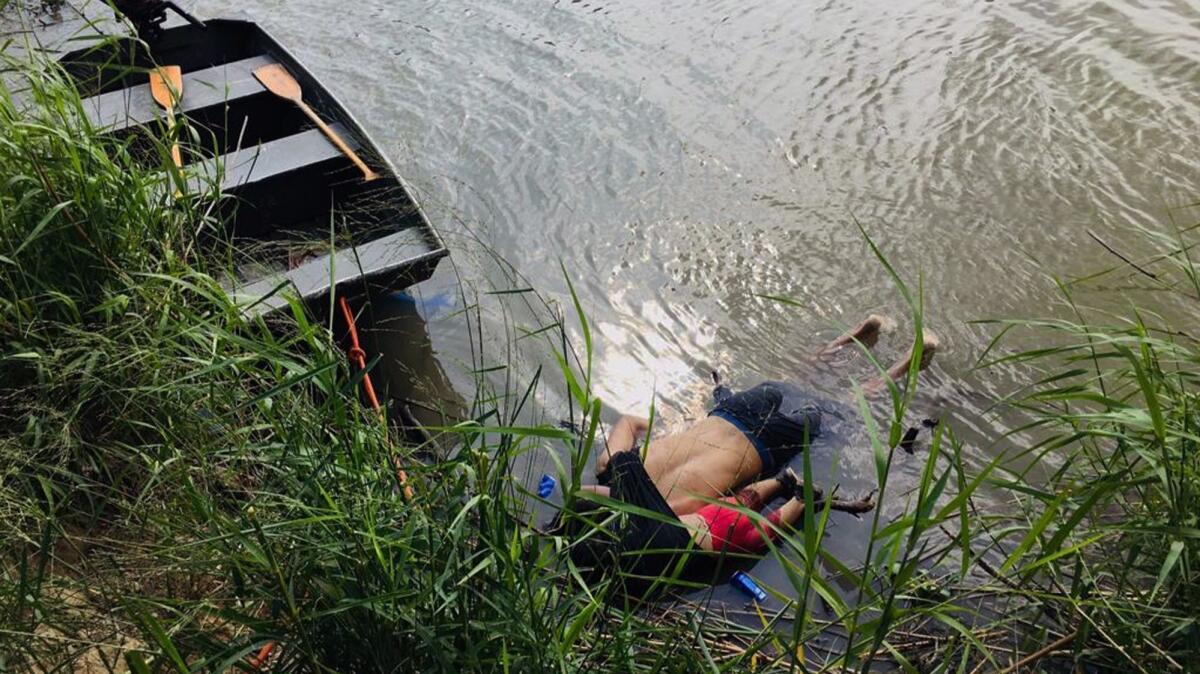Bodies pile up at the U.S.-Mexico border while Washington dithers on immigration

- Share via
A single photograph of two bodies has grabbed the nation’s attention. Taken from overhead, it shows a man face down in the water at the edge of the Rio Grande with his toddler daughter held to his back under his T-shirt. The stillness of the scene is in jarring contrast to what must have been their frantic last moments struggling against the muddy current in a doomed effort to reach the other side.
But theirs weren’t the only recent border deaths. On Sunday, Border Patrol agents found the bodies of a young woman, two infants and a toddler on the U.S. side of the border near McAllen, Texas, dead apparently of dehydration and heat exposure. The Border Patrol also reported finding the bodies of three men in different spots along the Texas side of the border last week, and the bodies of two men in the Rio Grande near Eagle Pass, Texas, about 130 miles southwest of San Antonio the week before. A 7-year-old girl was found dead in the Arizona desert on June 12, and, separately, the body of a woman in her 40s was found. She had lost consciousness and died after her traveling companions left her behind in southwest Arizona.
Death is a great deal to risk on a journey to the United States; only people truly desperate for safety, prosperity and a better life would do so. Even those who make it across and throw themselves at the mercy of the U.S. government face inhumane conditions and, occasionally, death. At least six migrant children died in the last year while in U.S. detention, according to one tally, and at least 10 adults have died since June 2018 while in U.S. custody or shortly after their release. An inspector general’s report found overcrowding so bad at one adult processing center in El Paso that men had to stand on toilets to make room for others and to try to get a whiff of non-fetid air.
A photograph of a dead toddler on her drowned father’s back should be speaking to us all.
A range of reports in recent weeks depict an immigration detention system dangerously overstuffed and ill-equipped to care for children who suddenly fall ill, or who need legal help, food, schooling, clean clothing or distractions from the monotony of incarceration while officials seek to find less-restrictive places for them. In some facilities advocates report that children have no access to showers, toothbrushes or soap; kids are described as filthy and in some cases, ill. Meanwhile, a government lawyer stunned a panel of judges from the U.S. 9th District Court of Appeals recently by saying that toiletries such as soap and toothbrushes might not be covered by the legal requirement that children be held in “safe and sanitary” conditions.
Washington has failed utterly to find solutions; it does little but bicker over how to address the problem. That stasis precedes Trump’s ascension, and it is a disheartening indictment of our dysfunctional political system in which elected officials are incapable of moving beyond partisanship to forge responsible solutions even in the face of a growing humanitarian crisis. Voters bear some of the blame for not demanding more of them, and for continuing to elect politicians who refuse to give ground even when lives are at stake. Trump and his anti-immigrant advisors have filled that void with appallingly draconian policies, apparently believing that making people miserable by holding them in substandard conditions and separating them from their children will dissuade others from entering the U.S. to ask for help. Beyond being ineffective — the migrants are still coming — it is grotesquely inhumane. If we, as a nation, do not raise our voices in collective outrage, we are complicit.
The father and daughter in the picture, Oscar Alberto Martinez Ramirez and 23-month-old Valeria, left El Salvador on April 3 with Martinez’s wife and the girl’s mother, Tania Vanessa Avalos. They spent two months in a Guatemalan detention center before continuing north, reaching Matamoros, across the river from Brownsville, Texas, on Sunday. They went to the U.S. consulate to make an appointment to seek asylum under Trump’s “wait in Mexico” metering policy (which is under legal challenge). It’s unclear what the family was told but the Associated Press reports that 40 to 45 asylum interviews are conducted daily, with a waiting list of more than 800 people. So the family decided Sunday to swim for it. In the early evening, Avalos watched from the Mexican riverbank as her husband and daughter foundered in the current and drifted away to their deaths.
Sometimes a single incident can galvanize the public. We hope that’s the case here. A photograph of a dead toddler on her drowned father’s back should be speaking to us all.
Enter the Fray: First takes on the news of the minute »
Follow the Opinion section on Twitter @latimesopinion or Facebook
More to Read
A cure for the common opinion
Get thought-provoking perspectives with our weekly newsletter.
You may occasionally receive promotional content from the Los Angeles Times.









